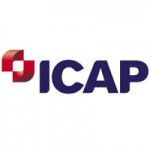
ICAP has reported its Q3 Interim Management Trading Statement for the period ending December 31st, 2014. The interdealer broker and post trade services firm reported that Group revenues declined by 1% on a constant currency basis from the same period the previous year, and 2% lower on a reported basis. Impacting growth was ICAP’s Global Broking division where revenues declined 8% year-over-year. ICAP blamed a “combination of factors including low interest rates, flat yield curves and bank deleveraging” that impacted the Global Broking group.
Looking ahead, ICAP announced that it will be focusing its Global Broking business in areas where it has “market leading positions”. As a result, the firm closed desks of unprofitable desks and operations. However, they will also be simultaneously investing more in leading profitable areas such as in OTC and European Interest Rate Derivatives trading, with ICAP stating, “which has benefited from rising Volatility and continues to develop hybrid and electronic trading offerings such as i-Swap and other matching platforms." It’s worth noting that a number of GFI Group brokers have stated to various media outlets that if their firm is acquired by BGC Partners they would be looking to quit. As such, such a scenario would create a ‘free agency’ of sorts for ICAP and other interdealers to grab talent for their brokerage desks.
Electronic Markets
Mitigating the Global Broking declines was ICAP’s Electronic Markets units. Headed by EBS which experienced strong FX volumes growth on rising volatility of currency prices, Electronic Markets experienced “low double digit revenue growth” during the quarter. Composed of EBS and BrokerTec, electronic markets composed nearly 19% of ICAP’s revenues in their previous fiscal year which ended March 31st, 2014, but was responsible for 36% of the firm’s operating profits. As a core unit of profits and revenues for ICAP, the firm announced in December that it was combining its EBS and BrokerTec electronic businesses under one unified structure led by EBS CEO, Gil Mandelzis.
During the current quarter, ICAP stated that trading on the BrokerTec platform was mixed, with growth in US Treasury products offset by a decline in Repos trading. Elsewhere, the firm noted that USD/JPY trading on EBS nearly hit a record on October 30th when the Bank of Japan announced its bond buying program. Also, ICAP reported that interest in its new EBS Direct relationship-based aggregated Liquidity platform remains strong with over 100 new customers in the pipeline.
Elsewhere, ICAP reported that its Post Trade Risk and Information unit achieved “low double digit” growth. The unit is composed of Traiana and TriOptima’s trade reporting, compression and reconciliation solutions.












